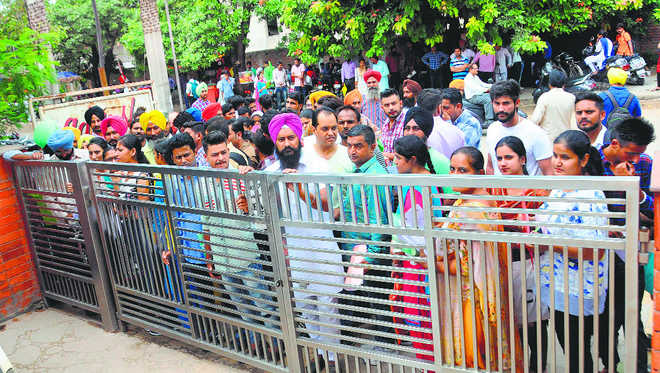
Waiting for their chance: Heavy rush of applicants at the Regional Passport Office in Industrial Area, Chandigarh. File photo: The tribune
M Rajivlochan
Out of school or college in Punjab, so what’s next — Canada, or Australia, what else! Can afford or can’t are secondary considerations, the primary is the flight out. The numbers are simply overwhelming. Just about everyone wants to migrate
America opened the doors of its universities and colleges. Indian students walked through them. Not one or two or a few thousands but over two hundred thousand (in 2018). This is the equivalent of 105 JNUs or 188 IISCs emigrating just to the USA.
India’s demographic dividend was siphoned off, not just by America but by 89 other countries as well. The Ministry of External Affairs tells us that in 2018, Indian students sought to go to countries as diverse as Uganda (1 student), Tanzania (2 students), Bosnia (2), Lebanon (4), Libya (5), St. Kitts & Nevis (10), Jordan (11) and Sudan (15).
Canada (1,24,000), Australia (87,115), New Zealand (30,000) and China (18,171) were other countries favoured by Indian students. Great Britain, since it promised to leave the EU, was not considered as great for studies. Only 16,550 Indian students were reported in the UK.
Between them these students took away about 7 to 15 billion dollars from India to pay for their tuition and hostel. The number of students going abroad, the RBI reports, has jumped by 44 per cent from 2013 to 2018, indicating that more parents have become rich enough to send their progeny abroad, paying anything between Rs 12 lakh to Rs 20 lakh per year for each of them. Many parents make this choice even at great financial and emotional costs to themselves as there is an inordinately heavy competition to get into meaningful courses in India.
The migration that results from a shortage of opportunities for getting higher education is ironically visible in India as well when we see thousands of young boys and girls coming to Karnataka, Andhra Pradesh, Maharashtra, Punjab and Delhi from Bihar, Odisha and the north eastern states to empower themselves with a degree.
There are a few things that stand out here. The first is the great value that people currently put on higher education. All over the world, parents and students willingly spend big money to get superior qualifications. The demand far outstrips supply. As a result, since 1990, while the cost of almost all economic goods has come down, the cost of education has more than tripled. As early as the 1960s, it had been recognised that a higher education usually translates into higher earnings. That connection seems to be even stronger today since the market demands skills that are complex. The constantly changing economy today needs a high order of communication skills accompanied by meta-skills, the skill to acquire new skills, which cannot yet be obtained at the school level.
India remains one of the few countries where the cost of education has not grown much. In some pockets, like JNU, Indian institutions continue to provide higher education at the rates that were prevalent in the 1970s.
Yet, the number of foreign students coming to India has been very low. Even JNU reported only 31 foreign students (14 men, 17 women) on its rolls for 2018-19. The IISc reported only 7 foreign students (7 men, 0 women) on its rolls for the same period.
In contrast, countries like China, Malaysia and Singapore, which too send out lakhs of students abroad, also manage to attract an equal number of foreign students to their own universities. For India, then, the student who goes abroad merely carries away a significant chunk of money. Indian universities significantly fail to attract even a fraction of foreign students. It is a matter of conjecture whether this is because of greater competition from universities abroad or because of the declining standards of education in Indian universities or because of the shortage of resources and faculty in Indian universities.
At the same time, institutions of higher education in India routinely report of seats going vacant. The latest being the series of horror stories that came out in the Tribune about applications for fresh enrolment in the technical and business management courses offered in Punjab. Only a handful of applications were received for thousands of seats. The Vice Chancellor tried to blame the Punjabi penchant to emigrate for this. What he did not say was that it is not just the strength of the degree that attracts Indian students abroad but also the possibility of a job abroad. A degree in India, at least today, does not necessarily translate into a job and, certainly does not provide useable skills. The link between learning and earning remains tenuous. In contrast, the time spent in getting a degree abroad becomes the time to find ways and means to ensure a much longer stay in a country that would welcome a migrant.
— The writer is Professor, Department of History, Panjab University



























